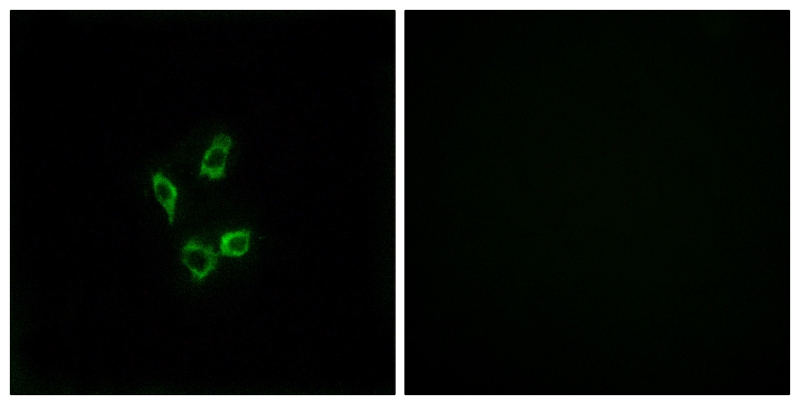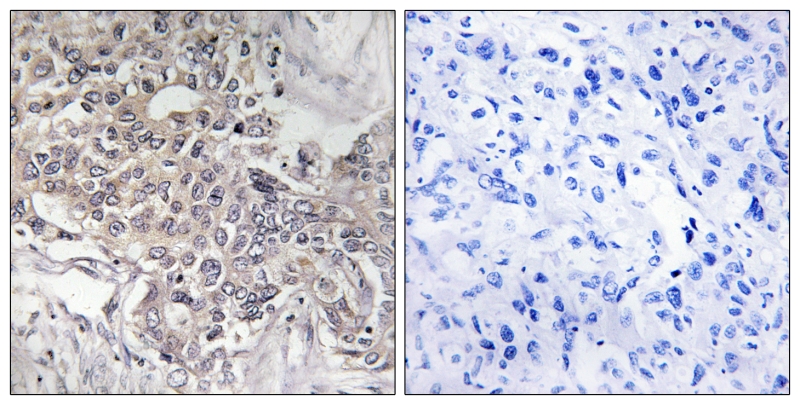

| WB | 咨询技术 | Human,Mouse,Rat |
| IF | 咨询技术 | Human,Mouse,Rat |
| IHC | 1/50-1/100 | Human,Mouse,Rat |
| ICC | 1/50-1/200 | Human,Mouse,Rat |
| FCM | 咨询技术 | Human,Mouse,Rat |
| Elisa | 1/10000 | Human,Mouse,Rat |
| Aliases | CYP4A20 |
| Entrez GeneID | 199974 |
| Host/Isotype | Rabbit IgG |
| Antibody Type | Primary antibody |
| Storage | Store at 4°C short term. Aliquot and store at -20°C long term. Avoid freeze/thaw cycles. |
| Species Reactivity | Human |
| Immunogen | The antiserum was produced against synthesized peptide derived from human Cytochrome P450 4Z1. AA range:71-120 |
| Formulation | Purified antibody in PBS with 0.05% sodium azide,0.5%BSA and 50% glycerol. |
+ +
以下是3篇涉及Cytochrome P450 4Z1(CYP4Z1)抗体的相关文献摘要:
1. **"CYP4Z1 overexpression promotes angiogenesis in breast cancer via upregulation of FAK"**
- *作者:Zhou et al. (2016)*
- 摘要:研究利用CYP4Z1特异性抗体,发现其在乳腺癌组织中高表达,并通过激活FAK信号通路促进肿瘤血管生成,提示其作为治疗靶点的潜力。
2. **"Characterization of monoclonal antibodies against human CYP4Z1 and their applications in metabolic studies"**
- *作者:Karlgren et al. (2004)*
- 摘要:报道了针对CYP4Z1的单克隆抗体的开发,验证了其在免疫组化和蛋白质印迹中的特异性,并用于研究CYP4Z1在多种肿瘤中的代谢功能。
3. **"CYP4Z1 expression correlates with poor prognosis in ovarian cancer"**
- *作者:Downie et al. (2007)*
- 摘要:通过免疫组化(使用CYP4Z1抗体)分析卵巢癌组织,发现CYP4Z1高表达与患者生存率降低相关,可能参与肿瘤耐药性调控。
4. **"CYP4Z1 promotes tumor angiogenesis through 20-HETE synthesis"**
- *作者:Deng et al. (2018)*
- 摘要:利用CYP4Z1抗体检测其在肿瘤内皮细胞中的表达,揭示其通过生成20-HETE促进血管新生,为抗血管治疗提供新方向。
(注:以上为简化示例,实际文献需通过PubMed或Google Scholar检索确认。)
Cytochrome P450 4Z1 (CYP4Z1) is a member of the cytochrome P450 enzyme family, primarily expressed in mammary and placental tissues. It is implicated in fatty acid metabolism, particularly in the conversion of arachidonic acid to bioactive lipids. Research has highlighted its overexpression in epithelial cancers, including breast, ovarian, and prostate cancers, where it correlates with tumor progression, angiogenesis, and poor prognosis. CYP4Z1 antibodies are essential tools for detecting its expression and localization in tissues or cell lines, aiding in studies of its pathological roles.
These antibodies, often developed against specific peptide sequences or recombinant proteins, enable immunohistochemical, Western blot, and immunofluorescence analyses. Studies using CYP4Z1 antibodies have revealed its association with cancer stemness and chemoresistance, potentially mediated by pro-angiogenic metabolites like 20-HETE. However, its precise mechanisms in carcinogenesis remain unclear, necessitating further research.
Commercial CYP4Z1 antibodies vary in clonality (monoclonal/polyclonal) and validation standards. Some clones, such as 4Z1-12. have been utilized to demonstrate differential expression between malignant and normal tissues. Specificity validation via knockout controls or siRNA silencing is critical due to potential cross-reactivity with other CYP4 isoforms. Recent advances include recombinant monoclonal antibodies with improved consistency, supporting translational studies exploring CYP4Z1 as a therapeutic target or biomarker.
×